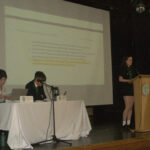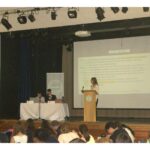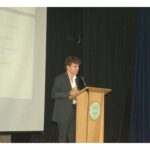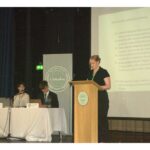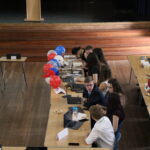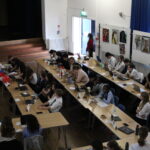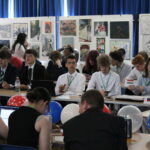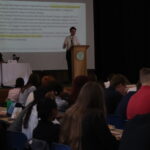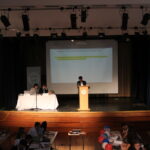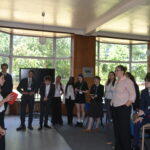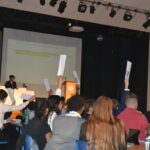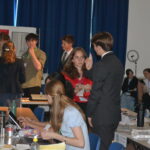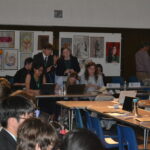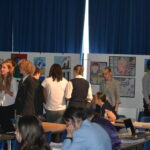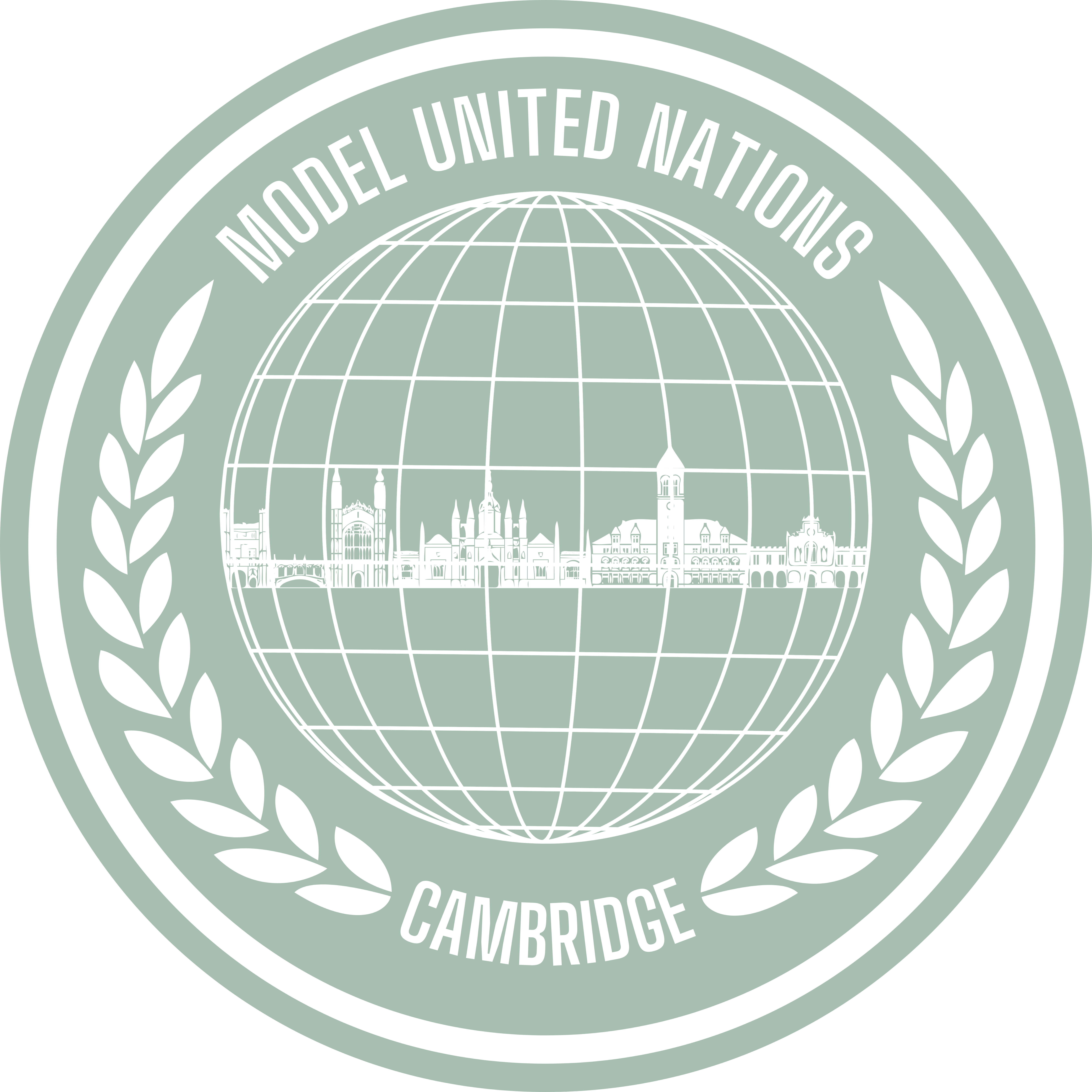Day 3
The final day began bright and early in the hall for the Forum Assembly. This is where all the delegates from each UN member state are present in one hall and will be debating the best resolutions (selected by the chairs) from each committee. This is an essential part of the event and aims to bring the committees together for a close to properly send-off MUNoC 2025. There was a certain buzz around the hall in the morning, as delegates were ready to bring their opinions to the mainstage and really make a change for the better.
The debate started off with the discussion of allowing least developed countries to adapt to the impact of climate change with a resolution that was proposed by the delegate of the Federal Democratic Republic of Ethiopia. Then the delegate suggested that the members who are the most responsible for climate change (with the greatest amount of greenhouse gases released) should help those who are less responsible and call for acknowledgement of the issue. The Ethiopian delegate expressed that the nation has released on 0.53% of all greenhouse gases and has also stated that the effects of climate change can force the decrease of their GDP to go up from 0.5 to 2% per annum.
Further a clause was introduced that less economically developed countries (LEDCs) also need a plan for receiving humanitarian aid and also the implementation of carbon tax should be required. It was then inquired for clarification regarding who the largest carbon emitters are and expressed that most of the financial support comes from the Hellenic Republic of Greece.
The representative of Algeria raised the subclause considering carbon emissions per capita. The delegation of Iran has then raised a concern regarding the consequences of elimination of the usage of fossil fuels saying that a fair amount of their nuclear resources have been destroyed during conflict especially with Israel and India supported this by saying that it would also impact the nations with high populations. Algeria responded with the idea that this subclause will not be applied in times of conflict.
The delegate of the USA has then raised a point that countries, especially smaller ones, are very unlikely to support the idea of using green energy as it requires for a fair amount of funds and space to do so to which Algeria said that space and funds will become a decreasing issue. The Republic of Belarus expressed the idea that they do trust the Western countries such as USA.
A further amendment was proposed by the Republic of Algeria gave clarifications that greenhouse gases harm manufacturers especially in LEDCs, and calmer sources of energy are being attacked by Israel and Iran. The delegate of Turkey expressed concern about the per capita because of countries like Brunei which releases 21.12 metric tons of CO2 equivalent per person and places Brunei significantly above the global average of 4.76 metric tons per capita and mentioned the preposition of UN sanctioned committees.
resolution 1: ECOSOC – Allowing least developed countries to adapt to the impact of climate change.
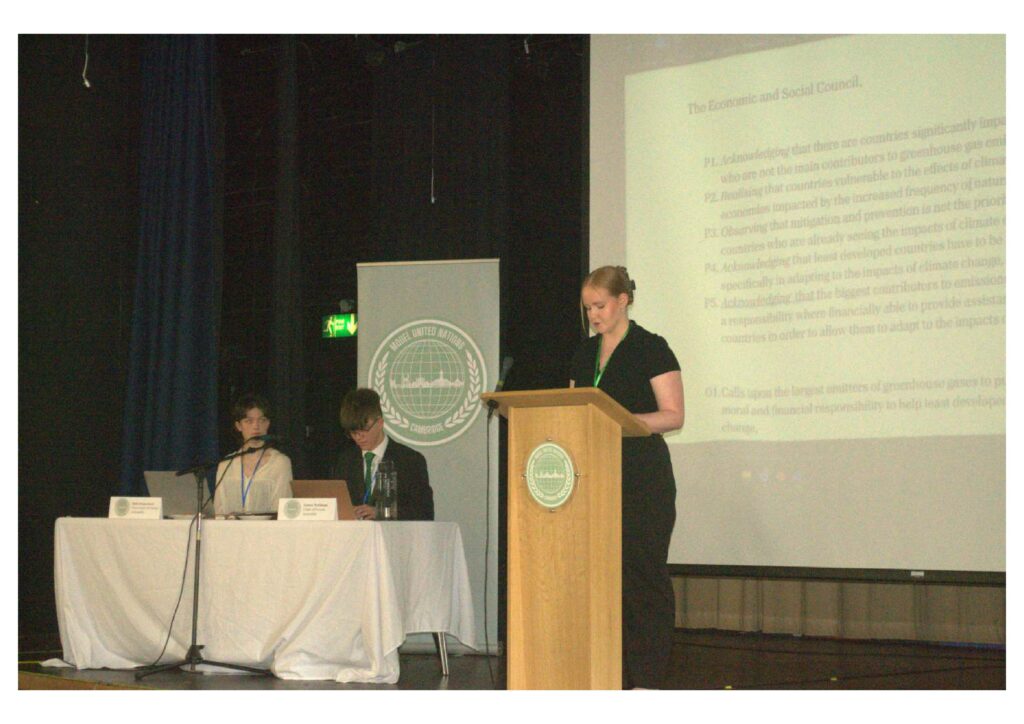
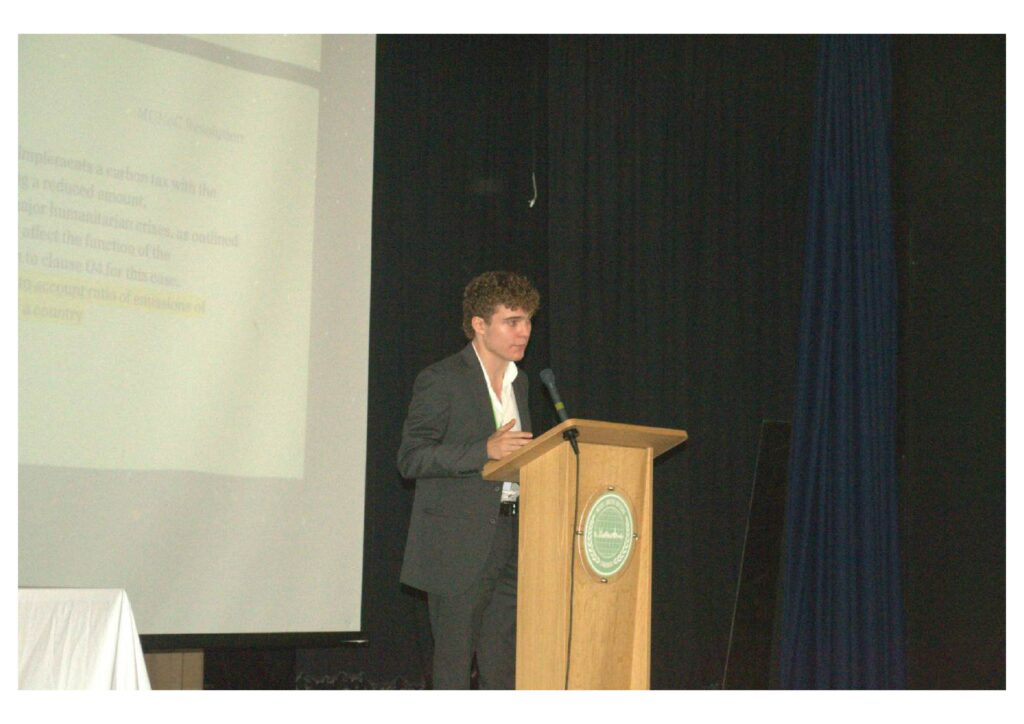
The next amendment that was against the resolution was filed by the delegation of the Russian Federation. This added a section to a clause that considered the land mass when proposing an appropriate tax, as Russia has the ECOSOC – Allowing least developed countries to adapt to the impact of climate change. largest land mass in the world and their delegation felt that it should be acknowledged. It’s clear that their stance was down to their place as a massive vendor of oil and gas. Algeria countered and said that if, hypothetically, there was a state with only 100 people that owned vast amounts of land and made it their mission to produce the greatest number of emissions as possible, should the same concessions be allowed to them. This argument was just about enough for the assembly as the amendment failed to pass due to a draw.
The Democratic Republic of Congo supported the resolution as it needed help while the USA spoke out against the amendment despite using 1000s more of barrels of oil than DRC. Iran further claimed that they are “capable of adapting green technology”. The Islamic Republic of Pakistan and Turkey, which suggested that money should be used for a final solution rather than for paying reparations, also expressed support for the amendment however Saudi Arabia, USA, Germany, China and others have spoken out against. The resolution was further rejected.
Resolution 2: Security Council - Adjusting to a Post-Truth world.
The debates at the Model United Nations of Cambridge (MUNoC) have heated up today, reflecting the ever-evolving global discourse on artificial intelligence (AI) and its influence on media and society. The session witnessed intense discussions on key amendments, with both contentious and harmonious outcomes.
The Second Amendment, which centered on regulating AI-made media, was a focal point of division. Algeria made a strong case, warning that AI is “the most dangerous thing we’re dealing with” today, arguing that while AI could significantly advance science and research, its harmful potentials cannot be ignored. “We do not approve of AI-made media,” Algeria stated, emphasizing the need for an outright ban rather than just a watermark solution to distinguish AI-generated content.
The United States, on the other hand, acknowledged AI’s rapid rise, calling it both “scary” and “full of opportunities.” While the U.S. emphasized the importance of adapting to technological advancements, it argued that a complete ban on AI would be impractical. “It’s almost impossible to have a complete ban on AI,” a U.S. delegate remarked, recognizing that such a move would be counterproductive to global innovation.
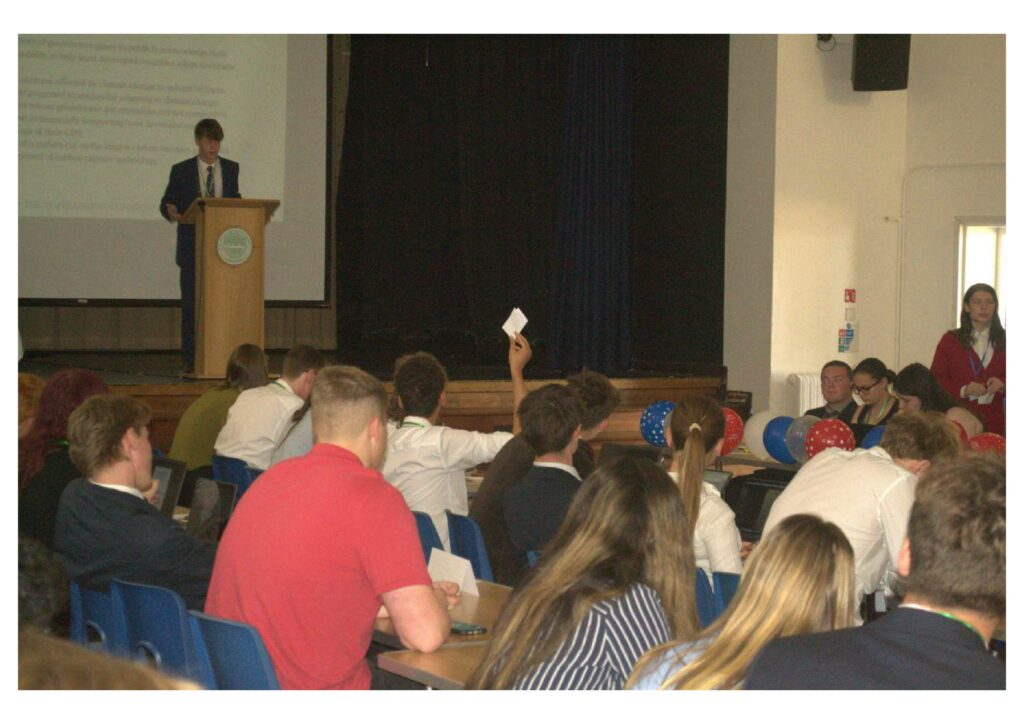
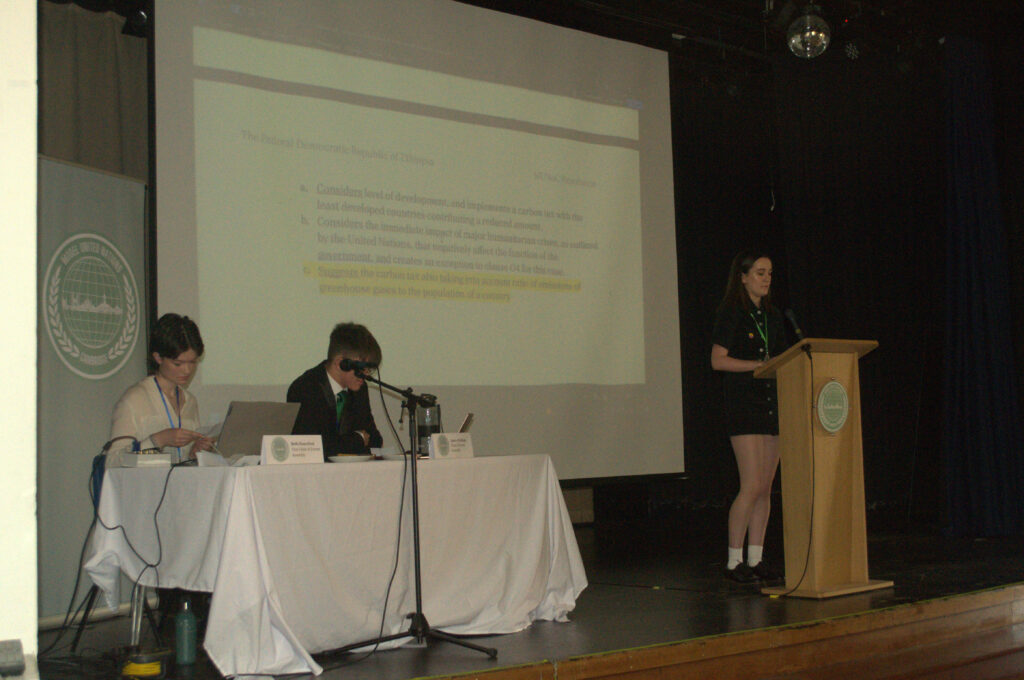
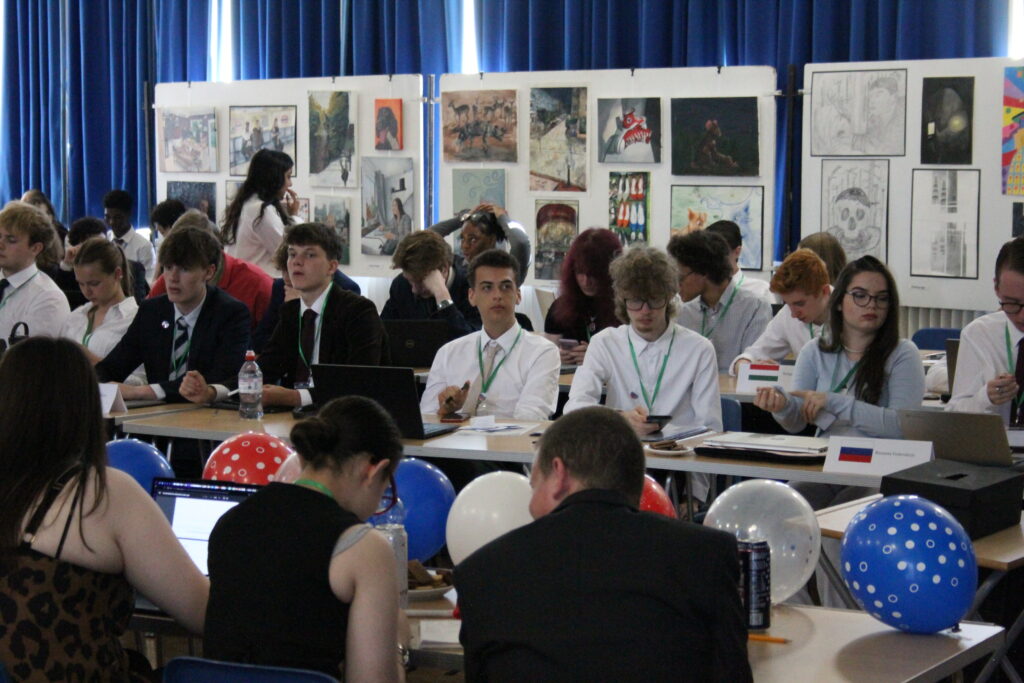
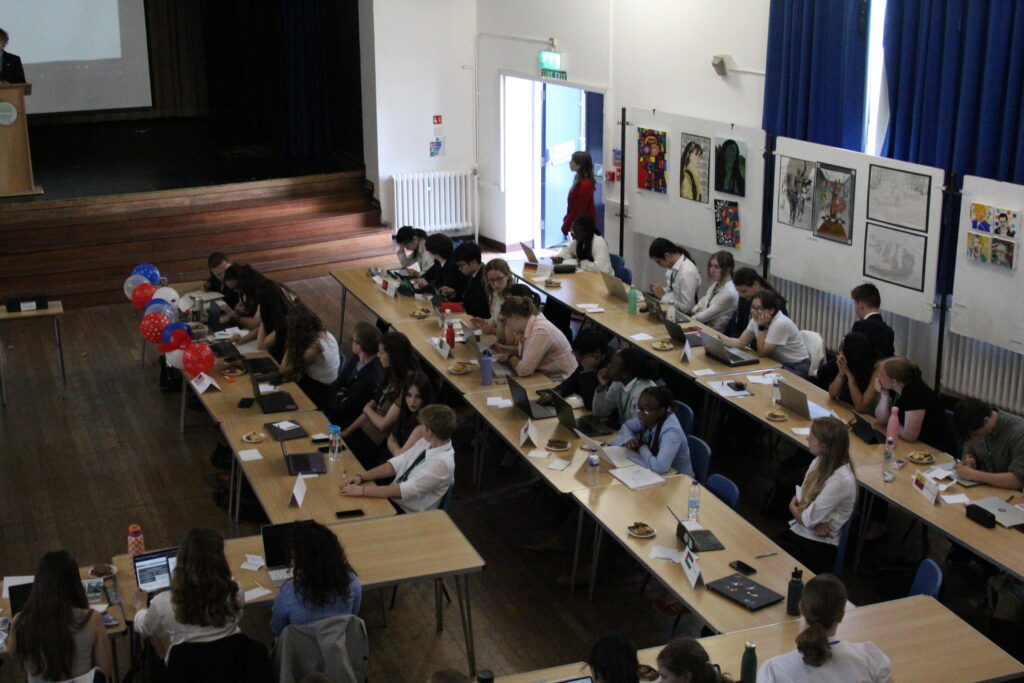
Despite the intense heat, the amendment failed after a split in the house. The debate revealed a fundamental divide between those advocating for stringent regulation of AI and those promoting technological progress while grappling with its risks.
The Fifth Amendment sparked heated debates over the role of neutral media platforms and the potential for governmental control over media narratives. Türkiye voiced strong opposition, with a delegate asserting that “correlation does not prove causation” when it comes to media regulation. Türkiye’s concerns centered on the importance of subsidizing media, rather than establishing a neutral, possibly state-controlled, media platform. “This should not just be stated for neutral media,” they added.
Algeria and Pakistan, however, underscored the necessity of media neutrality in promoting fair and accurate information. “Media should be neutral, and a platform alongside national and private neutral sources remains essential,” Algeria commented. Conversely, the U.S. stressed the complexity of defining “truth” in media, while France criticized the notion of “neutral” media, suggesting it would be used to promote a biased agenda.
The most striking comments came from Iran, which argued that a “neutral” media system is impossible, stating, “The U.S. will have the most control over the media and spread misinformation about the Middle East.” This Security CouncilAdjusting to a Post – Truth world. claim prompted questions from Panama, which provocatively asked, “Is Iran suggesting the UN is predominantly influenced by Western and European ideologies?”
Israel countered, arguing that the very notion of a unilaterally “neutral” media platform undermines the diversity of global perspectives. “If the UN is unrepresentative of global views, why collaborate in this organization at all?” they asked. The debate ultimately split the house, but the amendment was approved, signaling a shifting stance toward global media reform.
As the day continued, AI regulation remained a dominant theme in the discussions. Israel echoed concerns about the need for educational initiatives to foster societal understanding of AI’s impact. “Education should be pushed for our society,” Israel remarked, pointing to the Philippine amendment as a potential model for future regulations.
However, the challenge of practical regulation was not lost on the delegates. Algeria questioned the feasibility of AI bans, noting that while some nations had called for regulatory measures, they had yet to present concrete solutions. “How will AI be monitored and regulated?” asked Pakistan, encapsulating the doubts surrounding international governance of emerging technologies.
France and the U.S. also raised concerns, with the U.S. emphasizing the difficulty of policing AI in an age of digital democratization. “How will the UN regulate something that everyone can access freely?” one delegate questioned, warning of a “slippery slope” where over-regulation could stifle innovation.
As the day closed, the final resolution passed after intense negotiations. While a watermark solution was favored by some, the consensus remained that this issue is far from settled. Greece’s delegate summed up the general sentiment, stating that while the watermark solution may not be ideal, it is the best available option for now.
With global debates on AI and media regulation intensifying, today’s discussions at MUNoC revealed the complexities of balancing technological advancement with the safeguarding of public interest. As nations continue to navigate the challenges posed by AI, the road ahead remains fraught with both opportunity and uncertainty.
CRISIS
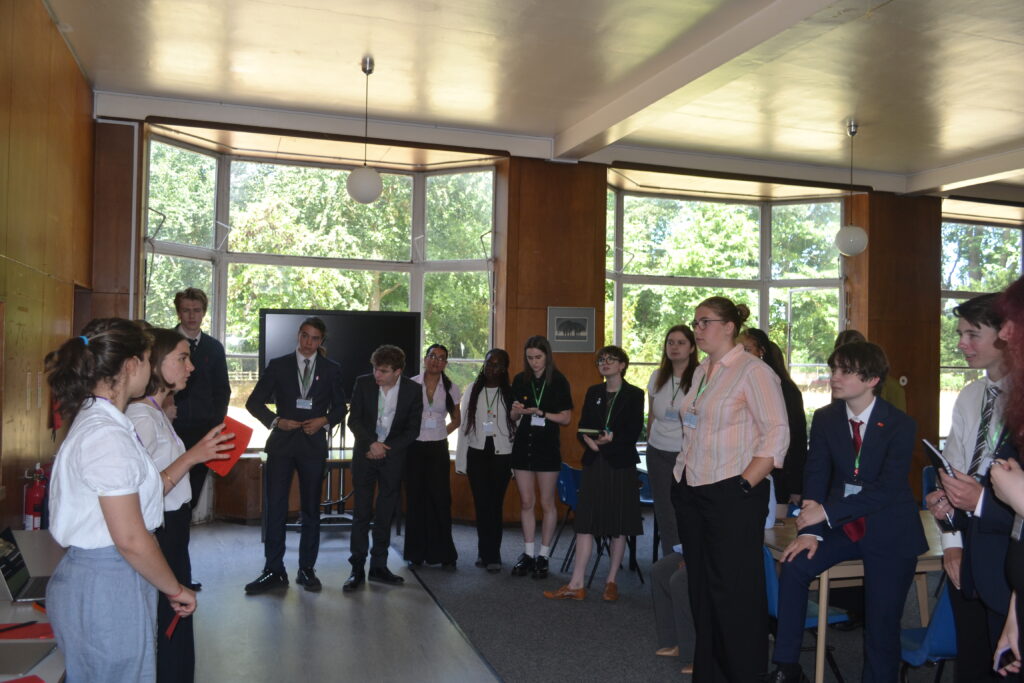
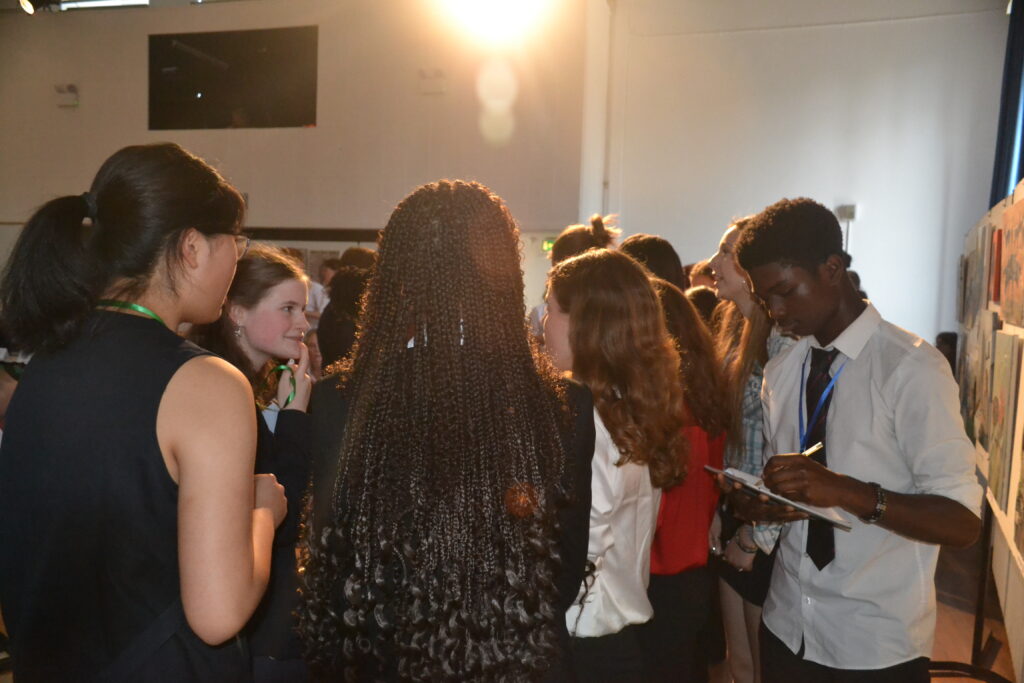
In the middle of the second resolution, the stage lights came on quite dramatically and the chairs called for order in the assembly. It was announced that there had been a crisis, although the chairs refused to elaborate any further. Ambassadors of each delegation were ushered out of the hall and into a certain room where they were informed of what had happened.
Camille, the head of Committee Chairs, explained that there had been an explosion at a semi-conductor factory in Taiwan of the company TSMC. This had leaked chemicals into nearby air and water reservoirs. Trade of semi-conductors had been essentially frozen, affecting the majority of the world seeing as 60% of the world’s semi-conductors are built in Taiwan. All other factories have been rendered useless and to make everything more difficult, the Republic of China has blockaded Taiwan in order to stop humanitarian aid. The ambassadors were given 20 minutes to lobby in the assembly to find out:
- What they think about the Republic of China blocking aid
- Whether the Republic of China’s one China policy is a factor to its decision making
- How are they going to deal with the issue of trade
Here is a summary of a few countries’ stances:
Republic of China
- The blockade is a result of Taiwan not wanting to be unified under the Republic of China
- Don’t want foreign interference
- Denies any accusations of their involvement with explosion
- Warns the US that any actions taken against then ‘will have repercussions’
United States
- First approached the Republic of China to find agreement
- Second approached the Republic of France as an ally to reach an agreement of some sort
- Emphasized that it would be ‘irresponsible’ to blame the Republic of China for the explosion, but condemn their actions to restrict aid
- Felt investigation into explosion was necessary
Germany
- Quite inactive stance
- Sees the geographical distance as enough to not get involved
- Somewhat lethargic to action
India
- Doesn’t recognize Taiwan
- Will put forward humanitarian aid
Pakistan
- Stands with the Republic of China as an ally but is concerned for international peace
Panama
- Doesn’t recognize Taiwan
- Concerned about trade and how it will affect traffic through the canal
- Demands for development of trade to continue as soon as possible
The first operative clause put together in the resolution was to reallocate forces of the State of Israel from Gaza to use as aid forces in Taiwan, which the delegation for the Republic of China has confirmed they will allow. The delegation of the Islamic Republic of Iran was quick to support this idea, seeing as a win-win as it demilitarises the middle-east and puts a force together to deal with an ongoing crisis. Many had an issue with this as a concept (most notably the State of Israel itself) due to the sheer distance the forces would have to cover, and whether or not they would be able to be deployed within an effective window; the explosion had produced arsenic in the air, which is toxic to humans. The delegation of the Hellenic Republic also found it difficult to believe any country would allow for the reallocation of forces during a conflict. This was almost unanimously rejected as an operative clause.
The second was put in order by Algeria, and suggested the idea of a coalition of African nations to step-up and replace Taiwan as the world’s leading producer of semi-conductors making using of the continents immense supply of minerals to do so safely and justly. They claimed so far western/more developed countries have essentially ‘pillage’ the continent and this was a good way for the continent to establish itself as a manufacturing power. With the addition of China to the clause in order to supplement the idea, it was passed.
The third was a call by the Hellenic Republic (Greece) for a full investigation into what had happened as to avoid future disasters. This was quickly passed as during lobbying was mentioned as a key point by almost every delegation.
Next there was a clause by Ecuador that called member states to take refugees where needed from Taiwan, as it was clear relocation was needed for as long a air and water had been chemically polluted. Although it is relatively easy for Ecuador to say, seeing as they are over 15,000 km away, the point was relatively popular, and after a few amendments aimed at clarifying how the amount of refugees accepted would be allocated, it was passed almost unanimously only opposed by Belarus and Iran.
The delegation of the State Israel then made a point of condemning the actions of China for withholding aid to the devastated area for, at best, no reason an at worst, their own gain. Despite the honorable sentiment, their actions towards civilians in Gaza was thrown in their face, an accusation to which they had very little reply. There was debating over whether sanctions would be sufficient by Panama, if the whole blockade was a distraction, or whether punishing them at all was worth it and actually helpful to fixing the situation. The United States made a bold statement, stating ‘Not supporting an area in need is – for lack of a better word – diabolical’. After some more deliberation (and more deflecting from the delegation of the State of Israel) the resolution was passed with a small majority.
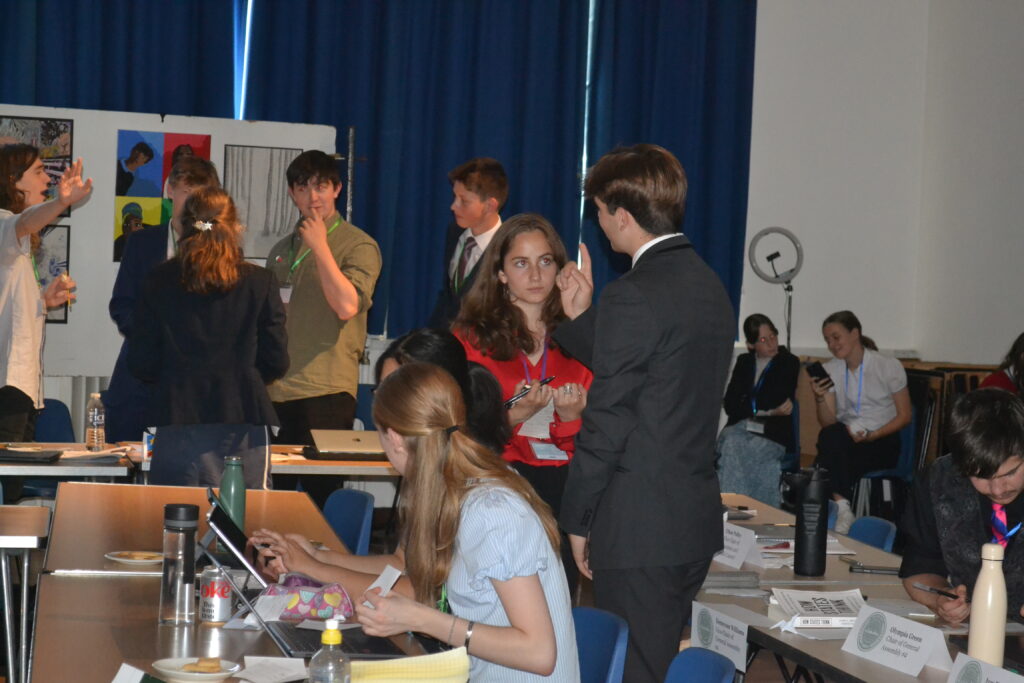
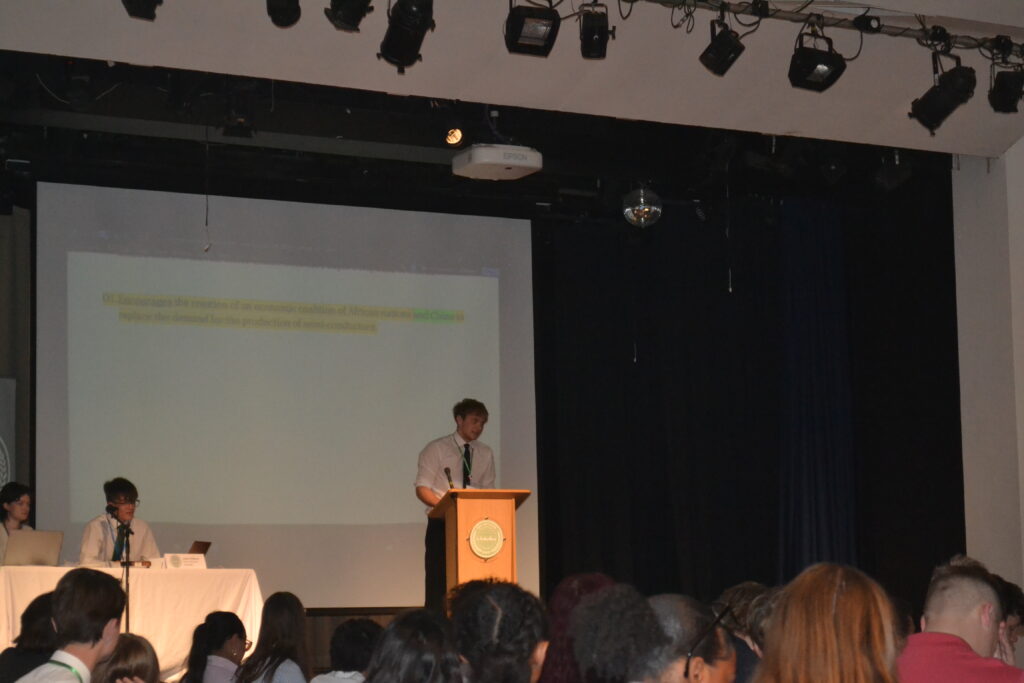
The Press team compiled some of the best notes passed at MUNoC 2025 which can be seen on page 7 of the pdf version of the paper!
They also created some of their own awards for four delegates in each committee which can be found on page 8.
Goodbye MUNoC 2025!
Today, on the last day of the of the MUNoC debates, the delegates discussed 2 resolutions: ‘helping least developed countries adapt to climate change (EcoSoc led by Ethiopia) and ‘adjusting to a post-truth world’ (security council). In the middle of the second resolution, an emergency crisis was introduced as there was a chemical disaster in Taiwan. This was to evaluate delegates’ crisis response skills.
We hope everyone has had a lovely time at MUNoC 2025. There’s been many memorable moments, for example, Security Council abolishing nukes and the unexpected Crisis.
Lots of hard work went into this conference from everyone on the IIC MUNoC team, and we hope it was worth it for all of you. From scandalous notes to intense lobbying to heated debates, this event has been a whirlwind. Over three days of spirited debate and strategic negotiation, students transformed committee rooms into miniature global arenas, proving that diplomacy is alive, well, and occasionally fueled by biscuits and midnight policy rewrites.
Everyone on the MUNoC team wishes you an amazing summer and we hope you’ve enjoyed the conference as much as we have enjoyed hosting it for you.
– The MUNoC Team


